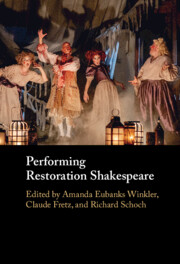Book contents
- Performing Restoration Shakespeare
- Performing Restoration Shakespeare
- Copyright page
- Contents
- Figures
- Tables
- Music Examples
- Notes on Contributors
- Foreword
- Acknowledgements
- Abbreviations
- Introduction: New Shakespeare for a New Era
- Chapter 1 From Boards to Books: The Circulation of Shakespearean Songs in Manuscript and Print during the Interregnum
- Chapter 2 Heroic Shakespeare at Lincoln’s Inn Fields
- Chapter 3 More than a Song and Dance? Identifying Matthew Locke’s Incidental Music for Macbeth
- Chapter 4 Cross-Dressing in Restoration Shakespeare: Twelfth Night and The Tempest
- Chapter 5 Performing Restoration Shakespeare in the Eighteenth Century
- Chapter 6 An Actor’s Perspective on Restoration Shakespeare
- Chapter 7 Staging Restoration Shakespeare with Restoration Music
- Chapter 8 Davenant’s Lady Macduff and the Subversion of Normative Femininity in Twenty-First-Century Performance
- Chapter 9 Facts as Ideas: The Theatricalisation of Scholarship
- Chapter 10 Syncopated Time: Staging the Restoration Tempest
- Bibliography
- Index
Chapter 8 - Davenant’s Lady Macduff and the Subversion of Normative Femininity in Twenty-First-Century Performance
Published online by Cambridge University Press: 28 January 2023
- Performing Restoration Shakespeare
- Performing Restoration Shakespeare
- Copyright page
- Contents
- Figures
- Tables
- Music Examples
- Notes on Contributors
- Foreword
- Acknowledgements
- Abbreviations
- Introduction: New Shakespeare for a New Era
- Chapter 1 From Boards to Books: The Circulation of Shakespearean Songs in Manuscript and Print during the Interregnum
- Chapter 2 Heroic Shakespeare at Lincoln’s Inn Fields
- Chapter 3 More than a Song and Dance? Identifying Matthew Locke’s Incidental Music for Macbeth
- Chapter 4 Cross-Dressing in Restoration Shakespeare: Twelfth Night and The Tempest
- Chapter 5 Performing Restoration Shakespeare in the Eighteenth Century
- Chapter 6 An Actor’s Perspective on Restoration Shakespeare
- Chapter 7 Staging Restoration Shakespeare with Restoration Music
- Chapter 8 Davenant’s Lady Macduff and the Subversion of Normative Femininity in Twenty-First-Century Performance
- Chapter 9 Facts as Ideas: The Theatricalisation of Scholarship
- Chapter 10 Syncopated Time: Staging the Restoration Tempest
- Bibliography
- Index
Summary
Apart from its singing and dancing witches, Davenant’s adaptation of Macbeth is most famous for expanding the role of Lady Macduff. Augmenting the mere nineteen lines afforded the character in Shakespeare’s text, Davenant significantly enlarges and complicates the role, giving Lady Macduff an additional four scenes, in which she demonstrates agency in both familial and political matters. This chapter puts Shakespeare’s and Davenant’s Lady Macduffs into conversation, exploring the opportunities and challenges presented by both versions of the role in performance. Combining theatre history, textual analysis, and practice-as-research methodologies, I begin by surveying the depiction of Lady Macduff in twenty-first century stagings of Shakespeare’s Macbeth. I argue that concepts of the feminine, the victim, and the mother define the interpretation of Lady Macduff in performance. I then contrast Shakespeare’s depiction of the character with that of Davenant, drawing on Anne Greenfield’s argument to consider how Davenant’s Lady Macduff might be considered a ‘subversive tragic heroine’. Developing this idea through practical exploration of Davenant’s Lady Macduff in performance, this chapter concludes by considering what practitioners today can learn from Davenant’s adaptation.
Keywords
- Type
- Chapter
- Information
- Performing Restoration Shakespeare , pp. 142 - 162Publisher: Cambridge University PressPrint publication year: 2023
- 1
- Cited by



